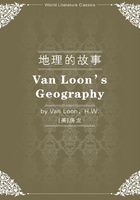
2.A Definition of the Word Geography and How I Shall Apply It in the Present Volume
BEFORE we start out upon a voyage, we usually try to find out more or less definitely whither we are bound and how we are supposed to get there. The reader who opens a book is entitled to a little information of the same sort and a short definition of the word“Geography”will therefore not be out of order.
I happen to have the“Concise Oxford Dictionary”on my desk and that will do as well as any other. The word I am looking for appears at the bottom of page 344,edition of 1912.
“Geography:the science of the earth's surface, form, physical features, natural and political divisions, climate, productions and population.”
I could not possibly hope to do better, but I shall stress some of the aspects of the case at the expense of others, because I intend to place man in the center of the stage. This book of mine will not merely discuss the surface of the earth and its physical features, together with its political and natural boundaries.I would rather call it a study of man in search of food and shelter and leisure for himself and for his family and an attempt to find out the way in which man has either adapted himself to his background or has reshaped his physical surroundings in order to be as comfortable and well nourished and happy as seemed compatible with his own limited strength.
It has been truly said that the Lord has some very strange customers among those who love Him, and indeed we shall find our planet inhabited by a weird and extraordinary variety of fellow-boarders. Many of them, upon first acquaintance, will appear to be possessed of very objectionable personal habits and of general characteristics which we would rather not encounter in our own children.But two billion human beings, even if they do not cut much of a figure when packed in a small wooden box, are still a very respectable number of people and among so many there is of course the widest possible scope for all sorts of experiments of an economic and social and cultural nature.It seems to me that those experiments deserve our attention before anything else.For a mountain is after all merely a mountain until it has been seen by human eyes and has been trod by human feet and until its slopes and valleys have been occupied and fought over and cultivated by a dozen generations of hungry settlers.
The Atlantic Ocean was just as wide and deep and as wet and salty before the beginning of the thirteenth century as after, but it took the human touch to make it what it is today—a bridge between the New World and the Old, the highway for the commerce between East and West.
For thousands of years the endless Russian plains lay ready to offer their abundant harvests to whomsoever should take the trouble to sow the first grain. But the aspect of that country today would be a very different one if the hand of a German or a Frank, rather than that of a Slav, had guided the iron-pointed stick that plowed the first furrows.
The islands of Nippon would shake and quake just as incessantly, whether they happened to be inhabited by aboriginal Japanese or by the remnants of the now defunct Tasmanian race, but in the latter case they would hardly be able to feed 60,000,000 people. While the British Isles, if they had been overrun by Neapolitans or Berbers instead of having been conquered by the restless fighters from northern Europe, would never have become the center of an empire one hundred and fifty times as large as the mother country and containing one-sixth of all the human beings now assembled on our planet.
Generally speaking, I have paid more attention to the purely“human”side of geography than to the commercial problems which are held to be of such great importance in a day and age devoted to mass production.
But experience has taught me that no matter how eloquent you wax upon the subject of importing and exporting, and the output of coal mines and oil reservoirs and bank deposits, you will never be able to tell your reader something which he can remember from one page to the next. Whenever he has need of such figures he will be obliged to look them up once more and verify them with the help of a dozen contradictory(and often self-contradictory)handbooks on commercial statistics.
Man comes first in this geography.
His physical environment and background come next.
The rest is given whatever space remains.